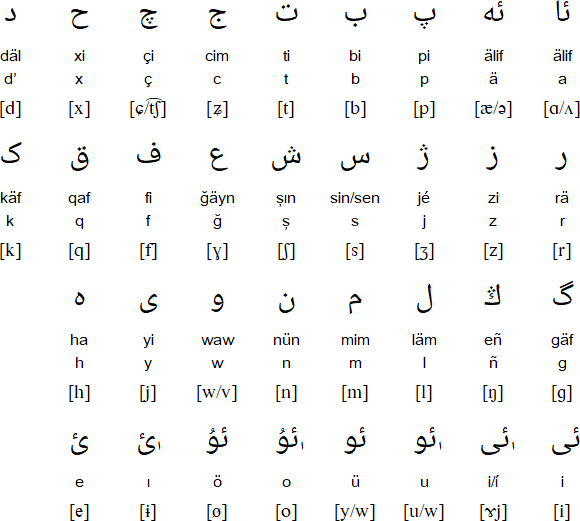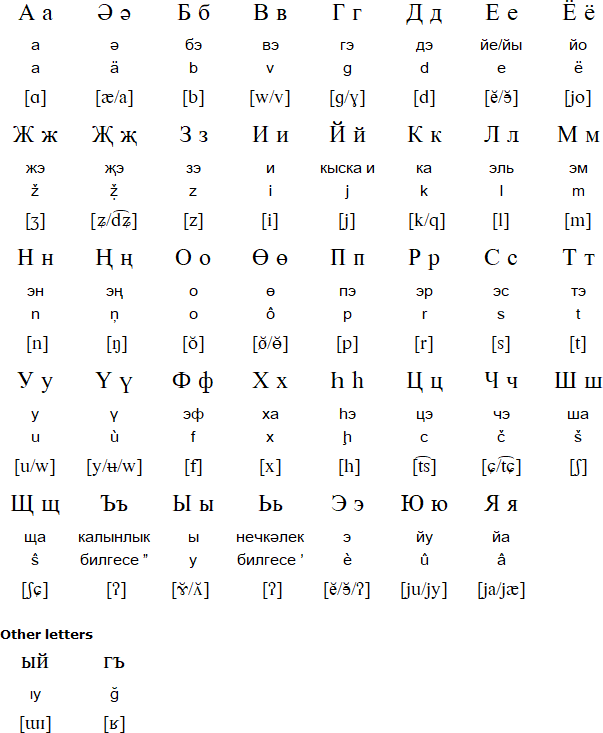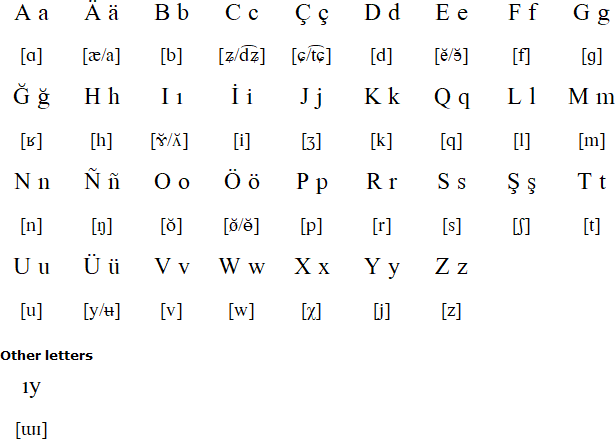Tatar is a Turkic language with about 5.2 million speakers mainly in the Russian Federation, particularly in the Republic of Tatarstan, and also in the Republic of Bashkortostan and other parts of Russia. Tatar is official recognised as a provincial language in Tatarstan, and is recognised as a minority language in Poland.
There are also Tatar speakers in a number of other countries, including Uzbekistan (702,000), Kazakhstan (104,000) and Turkmenistan (51,800) [source]
Tatar has been written with a number of different alphabets: before the 9th century AD it was written with the Orkhon alphabet. From the 1870s until 1920 it was written with a version of the Arabic alphabet known as İske imlâ ("Old Orthography"). A modified version of the Arabic alphabet known as Yaña imlâ ("New orthography") was used between 1920 and 1927. Since then it has been written with the Cyrillic alphabet and several of versions of the Latin alphabet.
This version of the Arabic alphabet was used to write Tator from 1920 to 1927.

In 1939 the Cyrillic alphabet was imposed by Stalin for Tatar and other Turkic languages spoken in the Soviet Union.

Notes and some corrections provided by 이윤호
In 1999 the government of Tatarstan decreed that a new version of the Latin alphabet for Tatar would come into official use alongside Cyrillic from 2001. The Russian Federation overruled this in 2002 and Cyrillic became, and remains, the sole official script for Tatar. In 2012 a new law came into effect in Tatarstan specifying that the new Latin alphabet would be the official way to transliterate the Cyrillc alphabet, and the Yaña imlâ became the standard way to write Tatar in the Arabic alphabet.

Download alphabet charts for Tatar (Excel)
In Russian loanwords, a is pronounced [a] and ç = [tɕ], e = [ɛ], ı = [ɨ], o = [o].
Corrections by Anıl Öztürk
ارلق كشیلر دا آزاد هم اوز آبرويلري هم حقوقلری یاغیننن تینک بولیپ طوالر. آلرغا عقل هم وجدان برلگان هم بر-برسینا قراطا طوغاننرچا مناسبتتا بولرغا تییشلر.
بارلئق كئشئلەر دە ئازات هەم ئوز ئابرویلارئ هەم حۇقوقلارئ یاعئننان تیڭ بولئپ توالار. ئالارعا ئاقئل هەم وۇجدان بیرئلگەن هەم بئر-بئرسئنە قاراتا توعاننارچا مۇناسەبەتتە بولئرعا تیئشلەر
Вarlьq keşelər də azat həm yz aʙrujlarь həm xoquqlarь jaƣьnnan tiꞑ ʙulьp tualar. Alarƣa aqьl həm vɵçdan ʙirelgən həm ʙer-ʙersenə qarata tuƣannarca mɵnasəʙəttə ʙulьrƣa tieşlər.
Барлык кешеләр дә азат һәм үз абруйлары һәм хокуклары ягыннан тиң булып туалар. Аларга акыл һәм вөҗдан бирелгән һәм бер-берсенә карата туганнарча мөнасәбәттә булырга тиешләр.
Barlıq keşelär dä azat häm üz abruyları häm xoquqları yağınnan tiñ bulıp tualar. Alarğa aqıl häm wöcdan birelgän häm ber-bersenä qarata tuğannarça mönasäbättä bulırğa tieşlär.
All human beings are born free and equal in dignity and rights. They are endowed with reason and conscience and should act towards one another in a spirit of brotherhood.
(Article 1 of the Universal Declaration of Human Rights)
Corrections provided by Reşat Sabiq
Information about the Tatar language | Numbers | Tower of Babel | Books about Tatar on: Amazon.comand Amazon.co.uk [affilate links]
Information about the Tatar language and alphabets
http://en.wikipedia.org/wiki/Tatar_language
http://en.wikipedia.org/wiki/Tatar_alphabet
https://en.wikipedia.org/wiki/İske_imlâ_alphabet
https://en.wikipedia.org/wiki/Yaña_imlâ_alphabet
https://www.mustgo.com/worldlanguages/tatar/
Online Tatar lessons and other resources
http://www.tatar.com.ru
http://tugan-tel.com
http://tatar.org.ru
https://anatele.ef.com/partner/anat/
Tatar phrases
Online Tatar dictionaries
http://suzlek.tazbash.ru
http://pauctle.com/tttr
Online Tatar news and radio
http://www.azatliq.org
Altay, Äynu, Azerbaijani, Bashkir, Chagatai, Chelkan, Chulym, Chuvash, Crimean Tatar, Dolgan, Fuyu Kyrgyz, Gagauz, Ili Turki, Karachay-Balkar, Karaim, Karakalpak, Karamanli Turkish, Kazakh, Khakas, Khalaj, Khorasani Turkic, Krymchak, Kumandy, Kumyk, Kyrgyz, Lop, Nogai, Old Turkic, Qashqai, Romanian Tatar, Salar, Shor, Siberian Tatar, Soyot, Tatar, Teleut, Tofa, Turkish, Turkmen, Tuvan, Urum, Uyghur, Uzbek, Western Yugur, Yakut (Sakha)
Abaza, Abkhaz, Adyghe, Aghul, Akhvakh, Akkala Sámi, Aleut, Altay, Alyutor, Andi, Archi, Assyrian / Neo-Assyrian, Avar, Azeri, Bagvalal, Balkar, Bashkir, Belarusian, Bezhta, Bosnian, Botlikh, Budukh, Bulgarian, Buryat, Chamalal, Chechen, Chelkan, Chukchi, Chulym, Chuvash, Crimean Tatar, Dargwa, Daur, Dolgan, Dungan, Enets, Erzya, Even, Evenki, Gagauz, Godoberi, Hinukh, Hunzib, Ingush, Interslavic, Itelmen, Juhuri, Kabardian, Kaitag, Kalderash Romani, Kalmyk, Karaim, Karakalpak, Karata, Karelian, Kazakh, Ket, Khakas, Khanty, Khinalug, Khorasani Turkic, Khwarshi, Kildin Sámi, Kili, Komi, Koryak, Krymchak, Kryts, Kubachi, Kumandy, Kumyk, Kurdish, Kyrgyz, Lak, Lezgi, Lingua Franca Nova, Lithuanian, Ludic, Macedonian, Mansi, Mari, Moksha, Moldovan, Mongolian, Montenegrin, Nanai, Negidal, Nenets, Nganasan, Nivkh, Nogai, Old Church Slavonic, Oroch, Orok, Ossetian, Pontic Greek, Romanian, Rushani, Russian, Rusyn, Rutul, Selkup, Serbian, Shor, Shughni, Siberian Tatar, Sirenik, Slovio, Soyot, Tabassaran, Tajik, Talysh, Tat, Tatar, Teleut, Ter Sámi, Tindi, Tofa, Tsakhur, Tsez, Turkmen, Tuvan, Ubykh, Udege, Udi, Udmurt, Ukrainian, Ulch, Urum, Uyghur, Uzbek, Veps, Votic, Wakhi, West Polesian, Xibe, Yaghnobi, Yakut, Yazghulami, Yukaghir (Northern / Tundra), Yukaghir (Southern / Kolyma), Yupik (Central Siberian)
Languages written with the Latin alphabet
Page last modified: 14.04.24
[top]
You can support this site by Buying Me A Coffee, and if you like what you see on this page, you can use the buttons below to share it with people you know.

If you like this site and find it useful, you can support it by making a donation via PayPal or Patreon, or by contributing in other ways. Omniglot is how I make my living.
Note: all links on this site to Amazon.com, Amazon.co.uk
and Amazon.fr
are affiliate links. This means I earn a commission if you click on any of them and buy something. So by clicking on these links you can help to support this site.
[top]